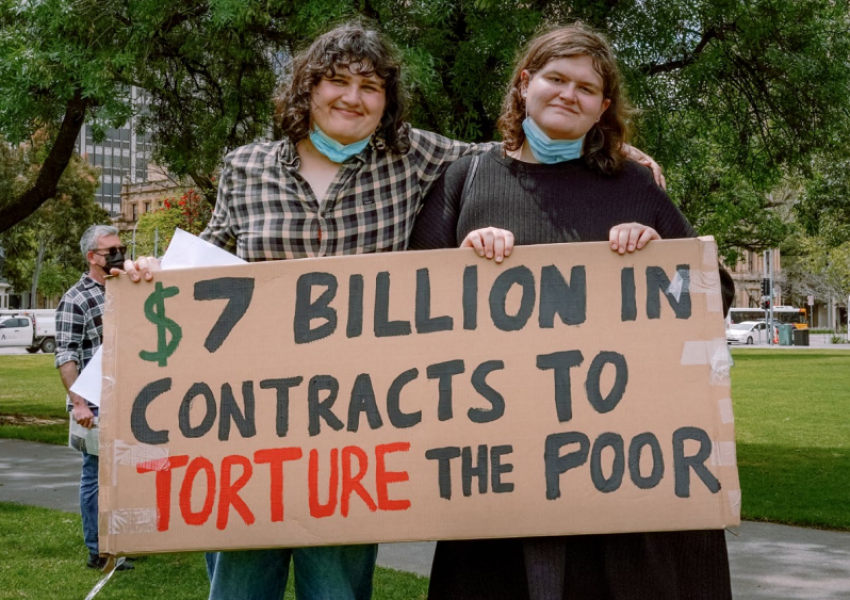
A report by the Antipoverty Centre, published by GetUp!, reveals just how punishing “mutual obligation” schemes are for those on JobSeeker and Youth Allowance.
Punishment for Profit: How private providers became the only winners in Australia’s cruel employment services system reports the experiences of 600 welfare recipients and details the failures of the privatised employment service industry.
The Antipoverty Centre said that while the first “major agenda item” at last week’s Labor conference was “An economy that works for everyone”, millions are being left behind.
“The public is out of pocket $4 billion a year while (un)employment providers make millions in profits rorting the system … it’s time for Labor to back up its words with action.”
The detailed report, published on August 16, revealed the federal government spends $4 billion a year on Workforce Australia, and other employment services, that “do little more than waste time and cause harm to the millions forced to use them”.
Unemployed people are forced into the coercive “mutual” obligations system, which have detrimental impacts on their health and ability to get and maintain a job. “As a result of interaction with the system, many people experiencing bullying and abuse in employment services can feel that suicide or self-harm are their only options.”
Surveys of welfare recipients, for Punishment for Profit, show 93% said “mutual” obligations have had a negative effect on their mental health.
From 278 responses, anxiety was mentioned 135 times, stress 112 times and depression 78 times. More than 40% said they experienced bullying or abuse by a provider, 53% said they had been mistreated and 34.81% said they had experienced discrimination.
Just 7% said their job agency had helped them to find a job and 2% said “mutual” obligations were useful.
Origins of mutual obligations
The report explores the origins of the “welfare-to-work” ideology that underpins the “mutual” obligations” system and programs such as work-for-the-dole.
As part of its neoliberal privatisation agenda under the Prices and Incomes Accord, the Paul Keating Labor government’s Working Nation report sought to deregulate government services and break up union control. This allowed private providers to compete for licenses with the Commonwealth Employment Service (CES).
The complete privatisation of the CES happened under the John Howard Coalition government when “mutual” obligations were developed, enforcing more onerous expectations on the unemployed.
These expectations now include compulsory training programs, applying for about 20 jobs a month even if the work is not relevant, attending regular in-person meetings with little purpose, being pressured into Work for the Dole programs and being penalised for non-compliance, with the ultimate penalty being a payment cut for 4 weeks.
Department of Employment and Workplace Relations data shows 20% of those under the online Workforce Australia system (18,815) were given a demerit compared to 39% (110,130) in face-to-face services. Of 1480 in the “penalty zone”, with a 50-100% cut off of their payment, 490 were First Nations, 325 had a disability and 150 were parents.
The report also detailed how private providers became concentrated, becoming mega organisations — including AimBig, APM and Salvos Employment Plus — with significant influence over governments.
APM has donated more than $700,000 since 2011: $334,433 to the Coalition and $385,315 to Labor. The value of APM’s employment contracts is about $787 million, the report noted.
Work for the Dole
The report found that 287 out of 348 Salvos stores use unpaid labour through the Work for the Dole program. Fifty-seven per cent of Salvos revenue comes from government sources.
Employment services programs funnels “billions in public money to poverty-profiteering organisations that make cash by enforcing cruel government policies”.
Workforce Australia replaced the JobActive system in July last year, despite calls by activists, unions and others to replace it with something genuinely helpful. It added a “panopticon layer” to the “mutual” obligations program — further outsourcing the monitoring of people on welfare to recipients themselves.
“People in poverty are forced to navigate a complex, badly designed and often broken online system to collect and log enough points to get a meagre welfare payment,” the report noted.
It said the mutual obligations system, coupled with payment rates, is “trapping people in long-term unemployment”. The increase in the average time on JobSeeker has gone from about 2 years in 2014 to more than 5.5 years.
It said employment supports need to be “reoriented away from punishment and provider profits” towards meeting the needs of those wanting to find paid work.
An income-first approach
Punishment for Profit makes nine recommendations aimed at ending the victimisation of the poor.
They are: raise income support above the Henderson poverty line and work with those receiving support to develop a sophisticated poverty measure; invest in quality public housing; end subminimum wage work; guarantee jobs with fair pay; end punitive and coercive compulsory “mutual” obligations; develop community-led employment programs; integrate employment assistance with other social supports; ensure democratic control and oversight of services; return employment services to public hands; and ensure work is available to those with disability, illness, caring duties or other responsibilities.
“People looking for work need help not harm,” the report concluded.
[Read the full Punishment for Profit report here.]